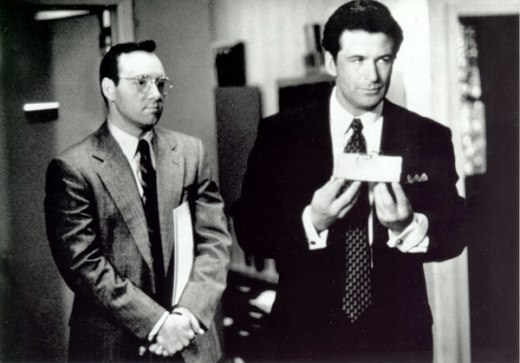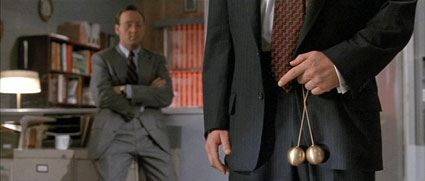David Mamet sends an ironic message with Glengarry Glen Ross that dishonesty and corruption become methods of surviving in the competitive world of men. His nineteen-nineties, post-modern representation of the crisis of masculinity glimpses into the lives of pressure-stricken salesmen when a system of capitalism forces them into fighting for job security. These conditions place the characters in a moral conundrum whereby they seek alpha-male prominence through material gains or fail by default of not meeting the sales standards of Mitch and Murray. Mamet, with the direction of James Foley and cinematography of Juan Ruiz Anchia, treats the film like his stage play by keeping the characters in a contained, fishbowl-like habitat so that the incessant rain, passing of the L train, and lingering presence of a detective in the merciless real-estate office isolates tensions between characters. Through an oppressive environment and performance styles of an all-male cast, Mamet situates the characters of Glengarry Glen Ross on scale of failure and success in a cutthroat, corporate workplace driven by masculinity.
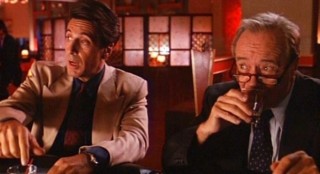 The implication that an order of free enterprise subordinates everyone in the office, including John Williamson, creates a male workplace under the notion of nothing being good enough. The winners keep their jobs and win a car or a set of knives (figure 5). The underachievers lose their livelihood, stripping them of their male pride. No options exist in between. This male-driven environment of the film presents itself through few, minimalist sets. Mamet contains the dialogue-driven actions and restlessness of the film in an atmosphere that maintains, as Vincent Canby mentions in his New York Times review, “… the claustrophobic nature of the original stage work,” (Canby, par. 5). This claustrophobia intensifies pressures of cutthroat mentalities as a pro-capitalist business creates the film. The enclosed environment also makes the world beyond feel empty, like the salesmen make pitches in a rainy, desolate world that predestines their failure.
The implication that an order of free enterprise subordinates everyone in the office, including John Williamson, creates a male workplace under the notion of nothing being good enough. The winners keep their jobs and win a car or a set of knives (figure 5). The underachievers lose their livelihood, stripping them of their male pride. No options exist in between. This male-driven environment of the film presents itself through few, minimalist sets. Mamet contains the dialogue-driven actions and restlessness of the film in an atmosphere that maintains, as Vincent Canby mentions in his New York Times review, “… the claustrophobic nature of the original stage work,” (Canby, par. 5). This claustrophobia intensifies pressures of cutthroat mentalities as a pro-capitalist business creates the film. The enclosed environment also makes the world beyond feel empty, like the salesmen make pitches in a rainy, desolate world that predestines their failure.
A sense of entrapment permeates throughout the film when the salesmen, whose jobs rely on communication, cannot communicate with each other. Though in the business of selling, they have literal barriers between each other. With Geroge Aaronow and Dave Moss, respectively, in the middle of the scale of failure to success, Alan Arkin’s portrayal of Aaronow creates a character 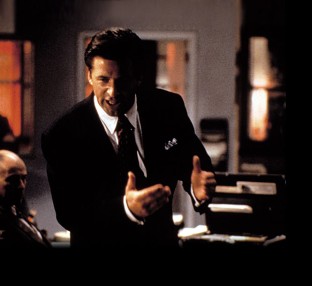 whose natural pace feels slower than the other characters. He talks slower and repeats back what he hears as a question. Where he exhibits passivity, getting nowhere because he does nothing except talk, Moss displays aggression without caring about consequences, like stealing leads from the office. In playing off the environment of the film, Moss makes Aaronow, the weaker of the two, feel trapped as an accessory to his schemes.
whose natural pace feels slower than the other characters. He talks slower and repeats back what he hears as a question. Where he exhibits passivity, getting nowhere because he does nothing except talk, Moss displays aggression without caring about consequences, like stealing leads from the office. In playing off the environment of the film, Moss makes Aaronow, the weaker of the two, feel trapped as an accessory to his schemes.
Shelley Levene, with the nickname “Machine” which sounds old and outdated, and James Lingk, respectively the weakest characters in the scale of failure and success, find their manhood reduced to motivations revolving around women. Levene thrusts himself into various immoral methods of conducting business for the sake of his sick daughter while Lingk backs out of his deal with Ricky Roma because of his wife’s disapproval. Levene’s determination for helping his sick daughter, a less self-serving need than wanting a car like Roma, pushes him to desperation. With the subtle reminder of a woman’s photo on his desk, the downfall of Levene prompts the audience in viewing failure as the ultimate death to masculinity, since he goes to the extreme of stealing for a female, in the corporate world.
Al Pacino’s performance as Ricky Roma, the most successful salesman in the office, makes the material prize, a Cadillac, his main concern throughout the film. His self-reliance makes him stronger, someone who excuses himself from the detective’s accusations of robbery and Blake’s condescending speech—where Baldwin emphasizes on the chalkboard a sales acronym that the working men see every day on a poster behind him. Through Pacino’s sweet-talking, confident acting style, Mamet points out the fault in the mentality of the characters needing “brass balls” 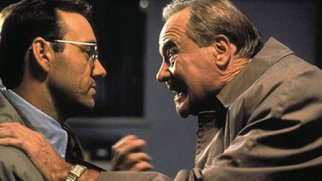 when Roma uses femininity in order for making his client feel masculine and in control. Roma uses femininity to his advantage, pitching to Lingk as if they sit together on a date, letting Lingk be the man with his arm across the booth as Roma seduces him into a sale with charisma.
when Roma uses femininity in order for making his client feel masculine and in control. Roma uses femininity to his advantage, pitching to Lingk as if they sit together on a date, letting Lingk be the man with his arm across the booth as Roma seduces him into a sale with charisma.
John Williamson becomes the physical antagonist to the salesmen of Mitch and Murray as a higher power that enables their struggles by not handing out good leads and messing up sales instead of cooperating with them. In his article, “A Cinema of White Masculine Crisis: Race and Gender in Contemporary British Film”, Niel Graham Slack discusses this inner-workplace divide in context of another working-man film of the nineties, The Full Monty:
Theirs is very much a group response, a coming together to ward off some notion of a challenge from ‘outside’ their ranks… this idea of coming together, of joining forces with one’s own kind for the purposes of defeating a common enemy… (Slack 74-5)
Slack’s analysis applies to the mentality of Williamson as a hindrance from the point of view of the other characters, yet they use him as a crucial figure in their deal-closing efforts and Williamson falls into their corrupt tactics as well. When Roma emasculates Williamson with insults, he scolds, “Whoever told you that you can work with men?… I’m going downtown… to Mitch and Murray. I’m going to Lemkin… you fairy. You company man…. You never open your mouth till you know what the shot is. You fucking child.”
Pacino plays his character like a parent in control of their rage, as if saying, “I am not mad at you, but I am disappointed,” while Spacey portrays Williamson, for the only time in the film, with a childish look of shame, especially at the sound “fairy” as an insult that correlates femininity with weakness. This moment of noticeable concern on the usually stoic Williamson’s face allow for a realization that though Williamson makes the decisions in the office, outside his comfortable authority exists a chain of command in the corporate world that terrifies him. The unseen men of the film, like Lemkin, make even Williamson feel subordinate. Here, he becomes on par with the salesmen as another fish in their bowl, under scrutiny of the capitalist system’s hierarchy that traps them.
The notion of not being masculine becomes evident not just in femininity, but also in the childishness that Roma detests Williamson for, which Levene exemplifies when Lemmon’s fast-talking pace for wordiness puts viewers on edge for a moment where he might, and ultimately does, open his mouth too soon. Likewise, in an unsuccessful pitch, viewers make the connection of childishness and Levene weakening himself when he sits on a couch where toys scatter around him. Lemmon even gives himself a moment where he holds the teddy bear before placing it beside him. 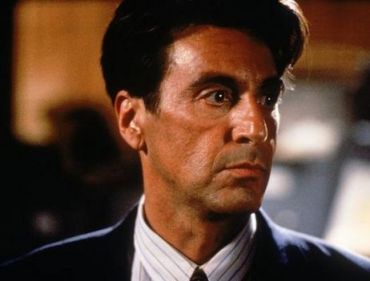 Levene, the character who tips his scale toward failure more than anyone else, encompasses both feminine motives and childishness.
Levene, the character who tips his scale toward failure more than anyone else, encompasses both feminine motives and childishness.
Even though Levene holds the literal fishhook, Lemmon’s character makes the least masculine of sales pitches here. By contrast, Pacino’s Roma, who sits at bars with his smooth-talking manipulation that pries on insecurities, becomes the only salesman capable of figuratively reeling in his clients as bait. Pacino’s acting centers on paying attention to people. He looks them in the eyes and tells them the stories they want, but Lemmon’s character spends more time convincing himself, not making direct eye contact and switching his sales tactics in an unnerving way that gets him sent out in the rain, without an umbrella of his own, on numerous occasions. Lemmon changes his personality and his facial expressions within brief moments based on the parts he plays for scheming, but because he seems so inauthentic, he fails at it, unlike Pacino who uses manipulation in a charming way. Ultimately, because his talk does not redeem him, Lemmon grabs for Kevin Spacey, resorting to physical force in reclaiming dominance and masculinity in the desperate situation.
 Finally, The L train tumbling through this dialogue-driven film implies action and the actor’s names appear on screen like passengers on the train. This indicates the constant rotation of salesmen in and out of the office, making the never-ending commitment to work from fear of burning out as Slack explains:
Finally, The L train tumbling through this dialogue-driven film implies action and the actor’s names appear on screen like passengers on the train. This indicates the constant rotation of salesmen in and out of the office, making the never-ending commitment to work from fear of burning out as Slack explains:
…it is shot through with a sense of fear the men see themselves as being under threat, not just as individuals but as a species. Moreover, it is not just in The Full Monty that this is the case, since this idea of extinction (the interpreting of issues such as unemployment… attributed with triggering a crisis in masculinity – as something more threatening still) is discernible in the other post-industrial films as well. (74)
From this dread of extinction and falling into a crisis of masculinity, the actors place their defeatism into well-timed reaction shots. Here, each tearful eye glints with the unhappiness of shattering hopes.
The salesmen in Mamet’s 1992 film exude disparity under the pressures of capitalist business promoting superiority in the workplace as a form of masculine success. Mamet’s ironic message makes the male-run system of capitalism, seen by the salesman as opportune for achieving their greater destiny, destroy them when unscrupulous tactics become their downfall. The competition between the characters that drives them to lying, scheming, and stealing leads them into turning on each other for a chance at getting ahead, commenting on world operating under a rigged game where nobody wins except the system itself.
Works Cited
Canby, Vincent. “Glengarry Glen Ross (1992) Review/Film; Mamet’s Real Estate Sharks and Their Prey.” Rev. of Movie. The New York Times 30 Sept. 1992: n. pag. The New York Times. The New York Times Company. Web. 15 Nov. 2013.
The Full Monty. Dir. Peter Cattaneo. Screenplay by Simon Beaufoy. Perf. Robert Carlyle, Tom Wilkinson, and Mark Addy. Fox Searchlight Pictures, 1997. DVD.
Glengarry Glen Ross. Dir. James Foley. By David Mamet. Perf. Alec Baldwin, Jack Lemmon, Al Pacino, Ed Harris, Kevin Spacey, and Alan Arkin. New Line Cinema, 1992. DVD.
Slack, Niel Graham. “A Cinema of White Masculine Crisis: Race and Gender in Contemporary British Film.” University of Sussex (2008): 74-75. Sussex Research Online. Web. 15 Nov. 2013.
